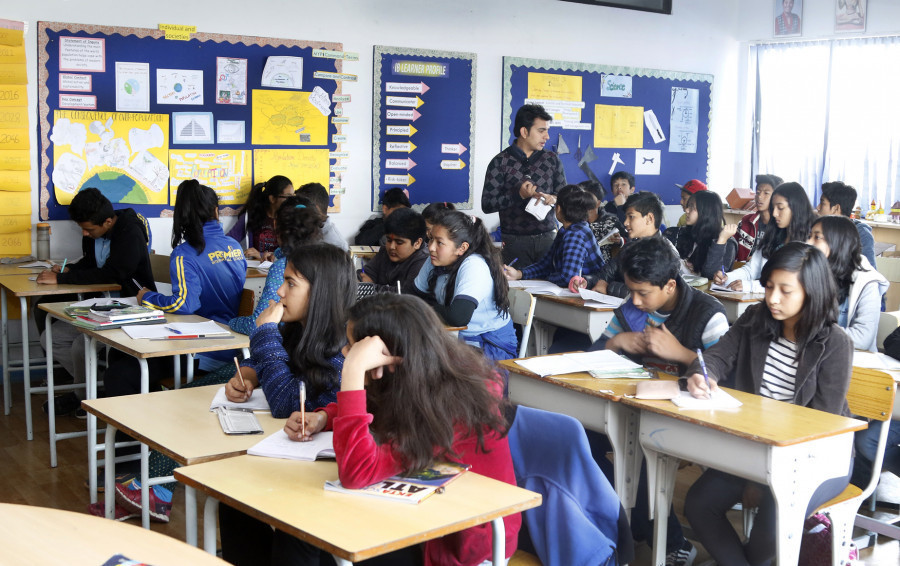Health
Bhaktapur school’s virus report raises concern
Health experts say educational institutions could become coronavirus hotspots if health and safety measures are continued to be ignored.
Arjun Poudel
At least 23 students and a teacher of the Nepal Army-run Sainik Awasiya Mahavidyalaya, Bhaktapur have tested positive for Covid-19, raising concern about academic institutions becoming coronavirus hotspots.
Although children are at relatively low risk of developing a severe form of the infection, health experts warn that they could pass on the virus to other vulnerable groups at their homes and communities.
“We have been warning that the academic institutions could become coronavirus breeding grounds and hotspots,” Dr Binjwala Shrestha, assistant professor at the Institute of Medicine, told the Post. “We have been asking authorities concerned to strictly implement safety measures and provide vaccines to the teachers first.”
A few weeks earlier, Covid-19 cases were detected in 40 students at an engineering college in Pokhara, according to the Epidemiology and Disease Control Division.
“We have managed cases at both places and directed agencies concerned to trace contacts of the infected people,” Dr Krishna Prasad Paudel, director at the Epidemiology and Disease Control Division, told the Post. “The infected individuals have been asked to stay in isolation and those who came into their close contact have also been tested.”
Meanwhile, Sainik Awasiya Mahavidyalaya has been closed for an indefinite period.
The school has been shut down from Monday, the Nepal Army has been conducting contact tracing of the infected students and the teacher,” Krishna Bahadur Mijar, chief of the health office in Bhaktapur, told the Post, over the phone. “We have been coordinating with school administration to contain the spread of infections.”
Tests of swab samples of those who came in close contact with the infected students and the teacher are being performed at the Army Hospital.
Brigadier General Santosh Ballave Poudyal, spokesperson of the Nepal Army, said the school has shut down from Monday to prevent the spread of the infection.
“In-person classes have been halted. Classes will be held virtually until further notice,” Poudyal told the Post.
According to Poudyal, after an administrative staff member of the school tested positive for coronavirus infection, the school had tested the students who had come in close contact with him.
The school had been taking in-person classes for students of grades 10, 11 and 12 class only.
The government had given authority to local levels to resume in-person classes in December last year, after the number of new cases started declining. Many academic institutions reopened that same month.
The Health Ministry says that schools and local governments are responsible for implementation of the safety measures to prevent the transmission of the contagious disease. However, officials at the ministry are unaware if the safety measures are being followed in schools and colleges.
According to Shrestha, of the Institute of Medicine, even people serving at front desks of hotels and restaurants are getting infected.
From a low of 47 cases on March 6, Covid-19 cases have been steadily rising in the country with 141 new cases reported on Monday.
Officials at the Ministry of Health and Population suspect that the new variant of virus might be responsible behind the recent spate of infections, as spike proteins have been found missing in swab samples of a lot of infected people.
However, whole-genome sequencing has not yet been performed on the swab samples of the infected persons to identify the virus variant.
S-gene target or spike protein is one of the key biological characteristics of SARS-CoV-2, which enables the virus to penetrate host cells and cause infections.
Without spike protein, the coronavirus cannot infect people, but doctors say that if the polymerase chain reaction tests are failing to detect the spike proteins in the swab samples of the infected people or negative s-gene target, there is a possibility that the virus may have undergone mutations or the virus could be of a different variant than the one common in the country.
The new variant of the coronavirus, the one that was identified in the United Kingdom in December, was detected in Nepal in January.
While the exact situation of the spread of coronavirus remains unknown as the authorities have given up on contact tracing since October, the recent outbreaks in educational institutions have alarmed public health experts.
New cases of infection had spiked after reopening of schools in Europe and America, and authorities there had shut down the schools.
“If we continuously ignore the implementation of health and safety measures, educational institutions could become the new hotspots for coronavirus,” Dr Prabhat Adhikari, an infectious disease and critical care expert, told the Post.




 17.12°C Kathmandu
17.12°C Kathmandu















